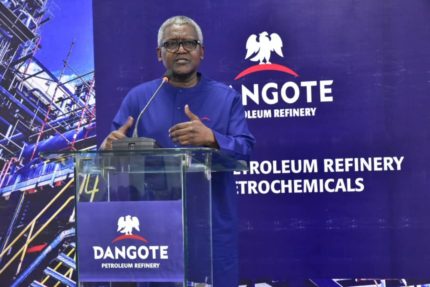Dangote Refinery has achieved a significant milestone in its quest for energy self-sufficiency with the commencement of petrol production. This marks the first time in 28 years that the country has produced petrol domestically. The refinery, owned by business magnate Aliko Dangote, is expected to significantly reduce Nigeria’s reliance on imported fuel.
The start of production at the Dangote Refinery is a testament to the country’s efforts to revitalize its refining capacity. With a capacity to produce 650,000 barrels per day, the refinery is poised to meet a significant portion of Nigeria’s fuel demands. The impact of this development on the country’s economy and energy sector is expected to be profound.
NNPC to Determine Fuel Price for Now
The Nigerian National Petroleum Company (NNPC) will determine the price of fuel produced at the Dangote Refinery for the time being. According to a source, “NNPC is going to take the whole cargo of fuel from Dangote, therefore they determine the price since subsidy is still in play.” This arrangement is expected to be temporary, with market forces expected to dictate prices in the long term.
The NNPC’s role in determining fuel prices is a result of the current subsidy regime. However, with the eventual deregulation of the downstream sector, prices are expected to be determined by market forces. This will enable the Dangote Refinery to operate on a commercial basis, with prices reflecting the realities of the market.
End of an Era: Nigeria’s Reliance on Imported Fuel Set to End
The commencement of production at the Dangote Refinery marks the beginning of the end of Nigeria’s reliance on imported fuel. For decades, the country has spent billions of dollars on fuel imports, a significant drain on its foreign exchange reserves. With domestic production set to meet a significant portion of fuel demands, Nigeria is poised to save billions of dollars annually.
The impact of this development on Nigeria’s economy cannot be overstated. The savings from reduced fuel imports will enable the government to invest in other critical sectors, such as infrastructure and healthcare. Additionally, the Dangote Refinery will create thousands of jobs, both directly and indirectly, contributing to the country’s economic growth.
Dangote Refinery: A Game-Changer for Nigeria’s Economy
The Dangote Refinery is a game-changer for Nigeria’s economy. With its massive production capacity, the refinery is poised to transform the country’s energy landscape. The impact of the refinery will be felt across various sectors, from transportation to manufacturing, as fuel prices are expected to stabilize and reduce.
The refinery’s impact on Nigeria’s GDP is expected to be significant, with some estimates suggesting a boost of up to 2%. This will make Nigeria one of the fastest-growing economies in Africa, with the Dangote Refinery playing a pivotal role in driving growth.
Nigeria’s Energy Self-Sufficiency: A Dream Realized
Nigeria’s dream of energy self-sufficiency has finally been realized with the commencement of production at the Dangote Refinery. For decades, the country has struggled to meet its fuel demands domestically, relying on imports to bridge the gap. However, with the Dangote Refinery, Nigeria is now poised to become a net exporter of fuel.
The impact of this development on Nigeria’s energy security cannot be overstated. The country will no longer be vulnerable to disruptions in global fuel supply, ensuring energy stability and security. Additionally, the Dangote Refinery will serve as a model for other African countries, demonstrating the feasibility of domestic fuel production.
A New Era for Nigeria’s Downstream Sector
The commencement of production at the Dangote Refinery marks the beginning of a new era for Nigeria’s downstream sector. The sector is expected to witness significant growth, with the refinery serving as a catalyst for investment and development. The impact of the refinery will be felt across various segments of the sector, from fuel marketing to logistics.
The Dangote Refinery’s impact on Nigeria’s downstream sector will be profound, with the sector expected to contribute significantly to the country’s GDP. The refinery will also serve as a model for other investors, demonstrating the viability of investing in Nigeria’s downstream sector.
Table of Contents
Discover more from OGM News NG
Subscribe to get the latest posts sent to your email.














